News and events from USTB about research, science and technology, social science, art,
faculty and staff, students life and issues happening all around the world.
Topics
Date
Views



From October 29th to 30th, the 3rd International Symposium on Language Science in the Era of Artificial Intelligence was held in USTB. The Conference themed on language acquisition, processing and barriers, focuses on the frontier topic of language research. The conference was hosted by the USTB School of Foreign Studies and the Research Center for Contemporary Language Science and was co-sponsored by the Professional Committee of Language Cognition and Intelligence Development of the Chinese Language Modernization Society, USTB School of Intelligence Science and Technology, and the Foreign Languages and Literature Studies. Experts and scholars from more than 100 colleges and universities around the world gathered in USTB personally or through the online meeting to participate in the academic feast. More than 1,800 people participated online and offline.
Prof. LI Yuming, former Deputy Director of the State Language Commission, former Director of the Language and Text Information Management Department at the Ministry of Education, former Chancellor of the Party Committee at Beijing Language and Culture University, and part-time professor of USTB, Prof. ZHANG Weidong, Vice President of USTB, Ms. ZHANG Na, Associate Dean of the Department of Science and Technology, Prof. Ban Xiaojuan, Associate Dean of the School of Intelligent Science and Technology, Prof. CHEN Hongwei, Dean of the School of Foreign Studies, Prof. SHEN Wei, secretary of the Party Committee, and all other leaders of the School of Foreign Studies attended the Opening Ceremony. The Opening Ceremony was presided over by Prof. REN Hulin, Associate Dean of the School of Foreign Studies.
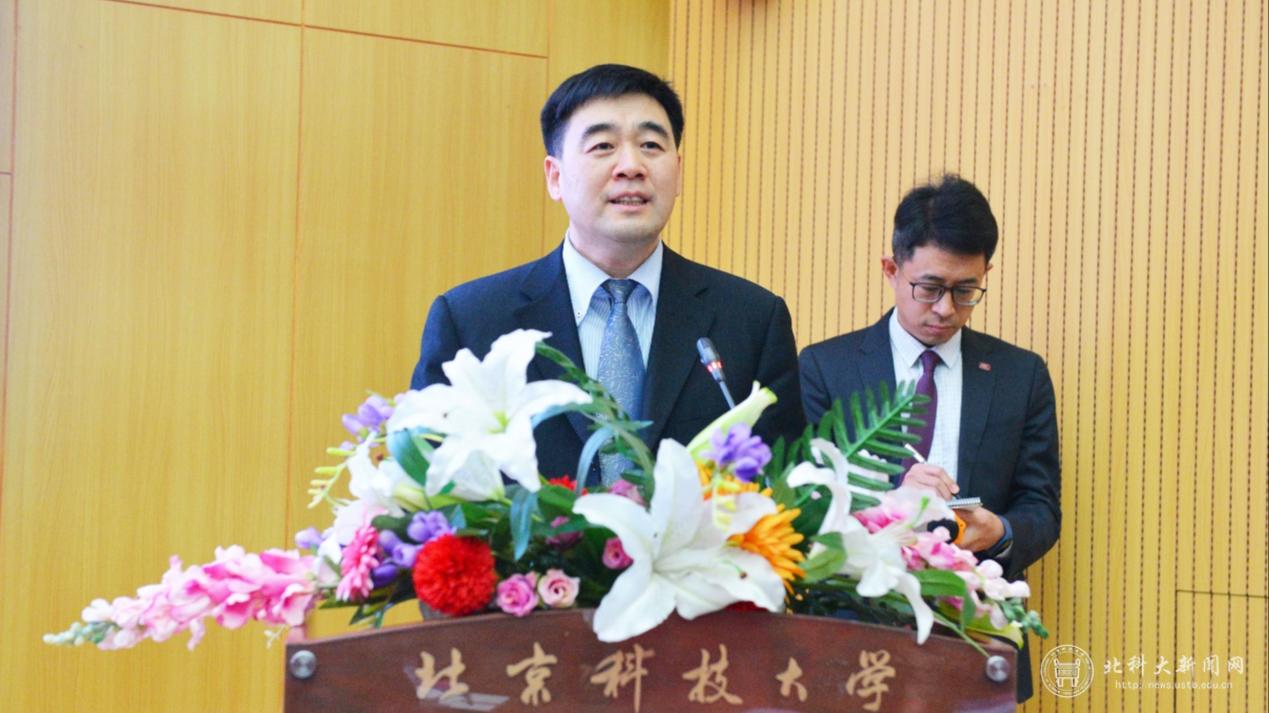
Prof. ZHANG Weidong addressed the Symposium
Prof. ZHANG Weidong, on behalf of USTB, congratulated the School of Foreign Studies on hosting the conference. He hoped to take this international conference on language science in the age of artificial intelligence as an opportunity to continuously promote the development of new interdisciplinary disciplines and contribute to the cultivation of high-caliber talents with high ideals, professional competence, and strong will to serve the country. Prof. ZHANG pointed out that the conference thoroughly discussed the research path of “AI + linguistics” and the joint building of an innovative development of language science in the new era. This is a road of win-win cooperation and also of mutual learning between China and Western countries.
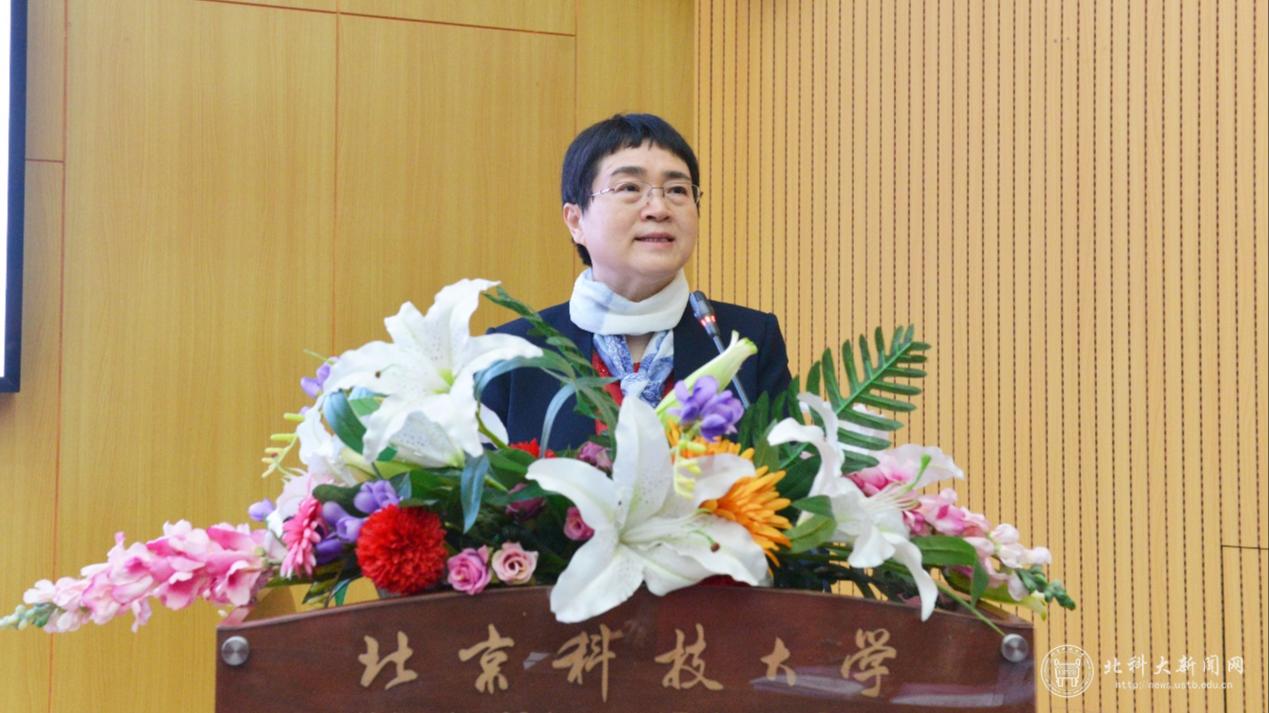
Prof. CHEN Hongwei addressed the Symposium
Prof. CHEN Hongwei first welcomed the school leaders and experts and expressed her sincere gratitude to all leaders and experts for their strong support and patient guidance in the work for the Symposium. She pointed out that the contemporary language has entered the “cyber era” in which people and machines are building together, and our language research has to be rewritten. She hoped that the Symposium could once again become a palace of communication and cooperation in language science, and promote the innovation and development of language disciplines in the new era.
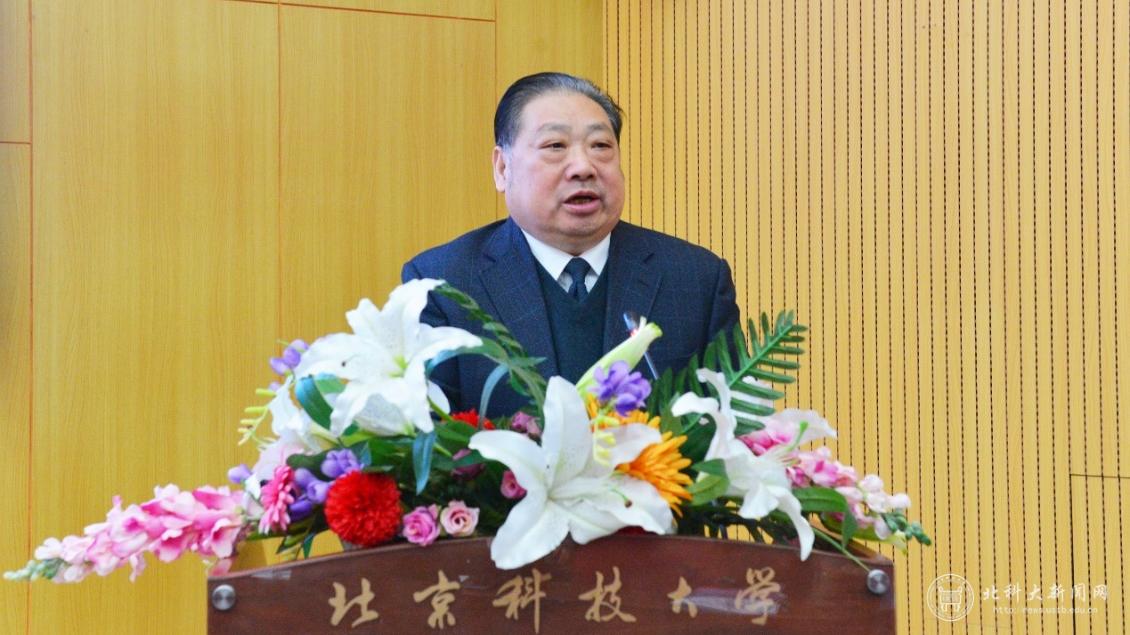
Prof. LI Yuming made a keynote speech
Subsequently, keynote speeches were delivered in turn. First, Prof. LI Yuming made an offline keynote speech. Then, other experts and professors at home and abroad made special speeches on their expertise in academic research.
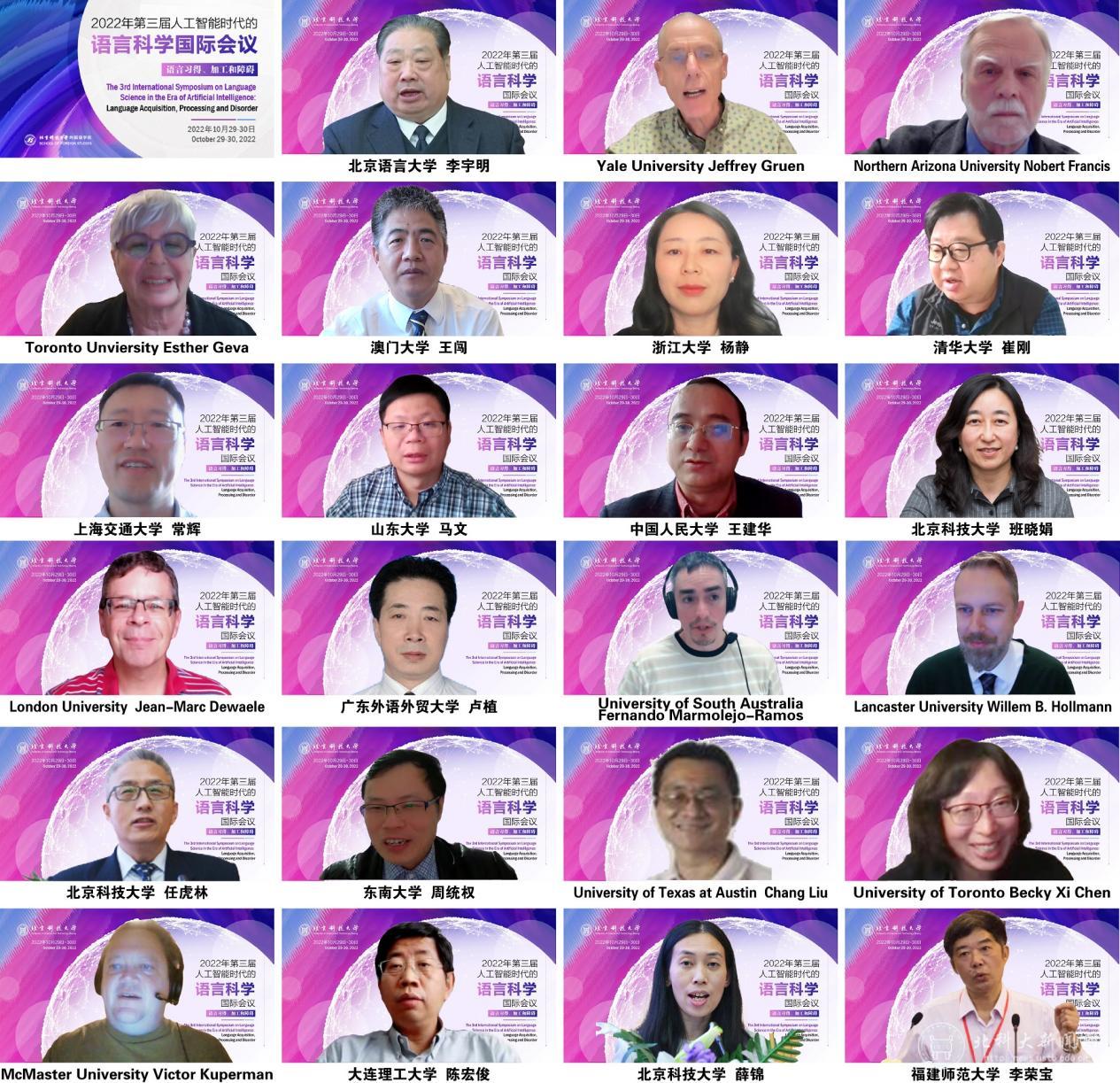
Keynote speeches from different experts
The Symposium lasted one and a half days, covering 22 keynote speeches, 3 thematic forums, and 17 subforums. 12 domestic experts shared their latest research achievements successively in the field of language science. Prof. LI Yuming gave his speech entitled “Research on Children-related People and Children’s Language: Who is influencing children’s language development? Who needs the support of children’s linguistics?” Prof. YANG Jing from Zhejiang University delivered a speech on Brain and Second Language Learning , and Prof. CUI Gang from Tsinghua University gave a report on Bilingual Advantages or Bilingual Disadvantages . Prof. CHANG Hui from Shanghai Jiaotong University talked on the Effects of Semantic Feature Analysis and Phonological Component Analysis Treatment on Mandarin-speaking Adults with Aphasia . Prof. MA Wen from Shandong University reported on Conversational Characteristics of Chinese Aphasia Patients and Their Implications for Daily Care , Prof. WANG Jianhua from the Renmin University of China gave his speech on the Progress and Future of Research on Multimodal Translation Cognition . Prof. BAN Xiaojuan from USTB reported on Artificial Intelligence Opens the Door to Communication for the Hearing/Visually Impaired . Prof. LU Zhi from Guangdong University of Foreign Studies spoke on An ERP Experimental Study on the Directionality of English-Chinese/Chinese-English Translation . Prof. REN Hulin from USTB delivered his report on the Processing of Counterfactual Conditional Sentences with Differential Propositional Truth-value in Mandarin Chinese--Evidence from ERP . Prof. CHEN Hongjun from the Dalian University of Technology addressed the report An ERP Study on the Role of Executive Control in Metaphor Comprehension and Processing of Second Speakers . Prof. LI Rongbao from Fujian Normal University reported on The Construction of Semantic Representation and its Access Mechanism in Bilinguals and Prof. XUE Jin from USTB reported on the Narrative Development of Chinese Children with Developmental Language Disorder .
10 representatives from outside of mainland China, including Prof. Jeffrey Gruen of Yale University, Prof. Norbert Francis of Northern Arizona University, Prof. Esther Geva of the University of Toronto, Prof. Chuang Wang of the University of Macau, Prof. Jean-Marc of the University of London, Researcher Fernando Marmolejo-Ramos at the University of South Australia, Professor Willem B. Hollmann, Lancaster University, UK, Professor Chang Liu of the University of Texas at Austin, Professor Becky Xi Chen, University of Toronto, and Associate Professor Victor Kuperman from McMaster University in Canada gave a report successively, which are: “High-throughput genetic screening for early detection of risk for reading disability”; “Domain-specific and domain-general aspects of language development: Research on learning processes related to System 1 and System 2”; “A Comparison of the Profiles and Predictors of Reading Comprehension in Elementary School English Language Learners and their Monolingual Peers: A Longitudinal Investigation”; “Relationship between self-efficacy beliefs, self-regulated learning strategies, and English language proficiency: Summary of three meta-analyses Studies”; “Learners experience of flow in foreign language classrooms”; “Embodied cognition in the era of AI”; “What linguists can learn from social psychologists (and vice versa)”; “Language Perception: The Challenges and Opportunities of Aging”; “Syntactic awareness and reading comprehension among English-French bilinguals”,and “Eye-movements in studies of reading and language learning”.
The conference also featured three thematic forums and 17-panel forums. There were three sub-topics, respectively “Integrating cutting-edge artificial intelligence and neuroscience in Chinese language learning and ancient poetry appreciation”, “Second language/bilingual vocabulary cognition and processing” and “Neuro/psycholinguistics”. There are seven sub-topics: “Cognitive Neuropsychological Perspectives on Language Acquisition, Development, and Processing”, “Applications of Artificial Intelligence in Language Research”, “Characteristics, Diagnosis, and Interventions in Speech-Language Disorders”, “Online processing and teaching research in interpreting and translation”, “Research on bilingual development and influencing factors”, “Psychological research in language learning and education”, and “Other Topics”. The conference was well organized and well-structured and was an academic conference with high-level and high-quality. The exchange of ideas and cooperation between Chinese and foreign experts at this event fully demonstrated the new achievements in the field of language science in China and reflected the new interdisciplinary progress.
On the morning of 30th October, the conference was successfully concluded with applause from the participants. The Closing Ceremony was presided over by Prof. XUE Jin, Director of the Research Center for Contemporary Language Science in the School of Foreign Studies of USTB. Prof. LI Rongbao of Fujian Normal University, Vice President of the Chinese Association of Psycholinguistics, and Prof. SHEN Wei, Secretary of the Party Committee of the SFS, delivered speeches at the Closing Ceremony.
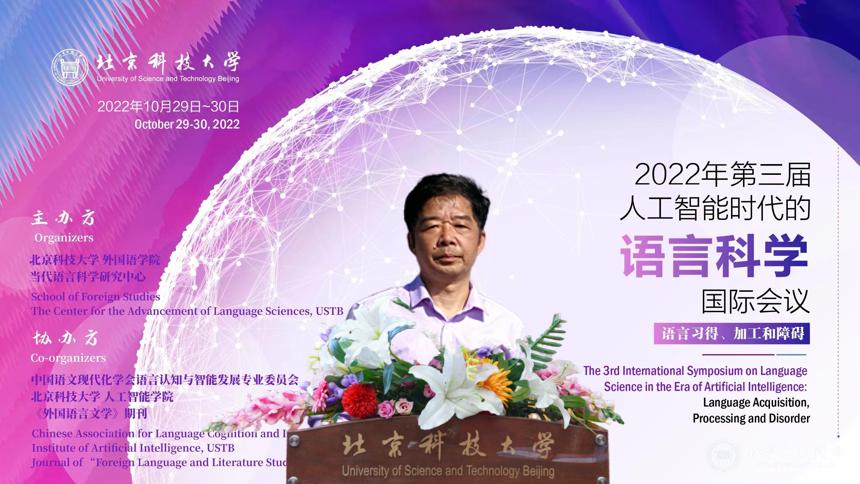
Prof. LI Baorong addressed the Closing Ceremony
Prof. LI Rongbao reviewed and summarized the wonderful speeches of the participating experts and scholars, fully affirming the importance of the conference as a platform for interdisciplinary research in language science. Prof. LI pointed out that the conference was an academic feast of interdisciplinary research in language science, further opening up interdisciplinary research in language science in the age of artificial intelligence and expanding the integration of interdisciplinary research in language science, which is a substantial initiative to implement the new liberal arts development strategy ofthe MOE and has far-reaching implications for the academic community.
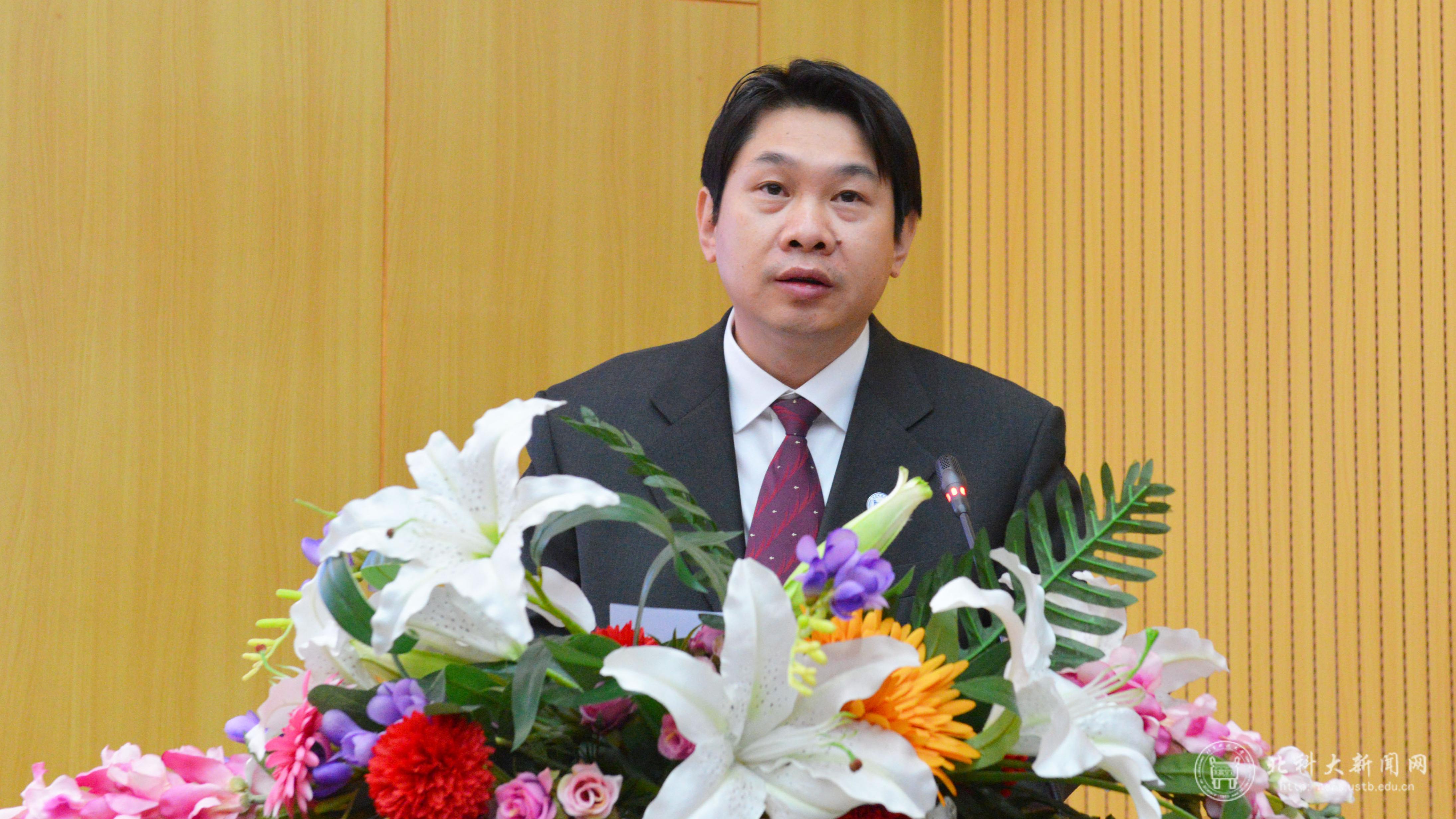 Prof. SHEN Wei addressed the Closing Ceremony
Prof. SHEN Wei addressed the Closing Ceremony
Prof. SHEN Wei congratulated the conference for the successful completion of the set agenda and content. Prof. SHEN said that USTB will take this conference as an opportunity to study and implement the spirit of the 20th National Congress of the CPC, adhere to self-confidence and self-improvement, keep the righteousness and innovation, actively carry out academic exchanges and research in the interdisciplinary field of language science, thus promoting the construction of the discipline system of philosophy and social science with Chinese characteristics, academic system and Chinese language system, and introducing Chinese culture to the world in a better way.
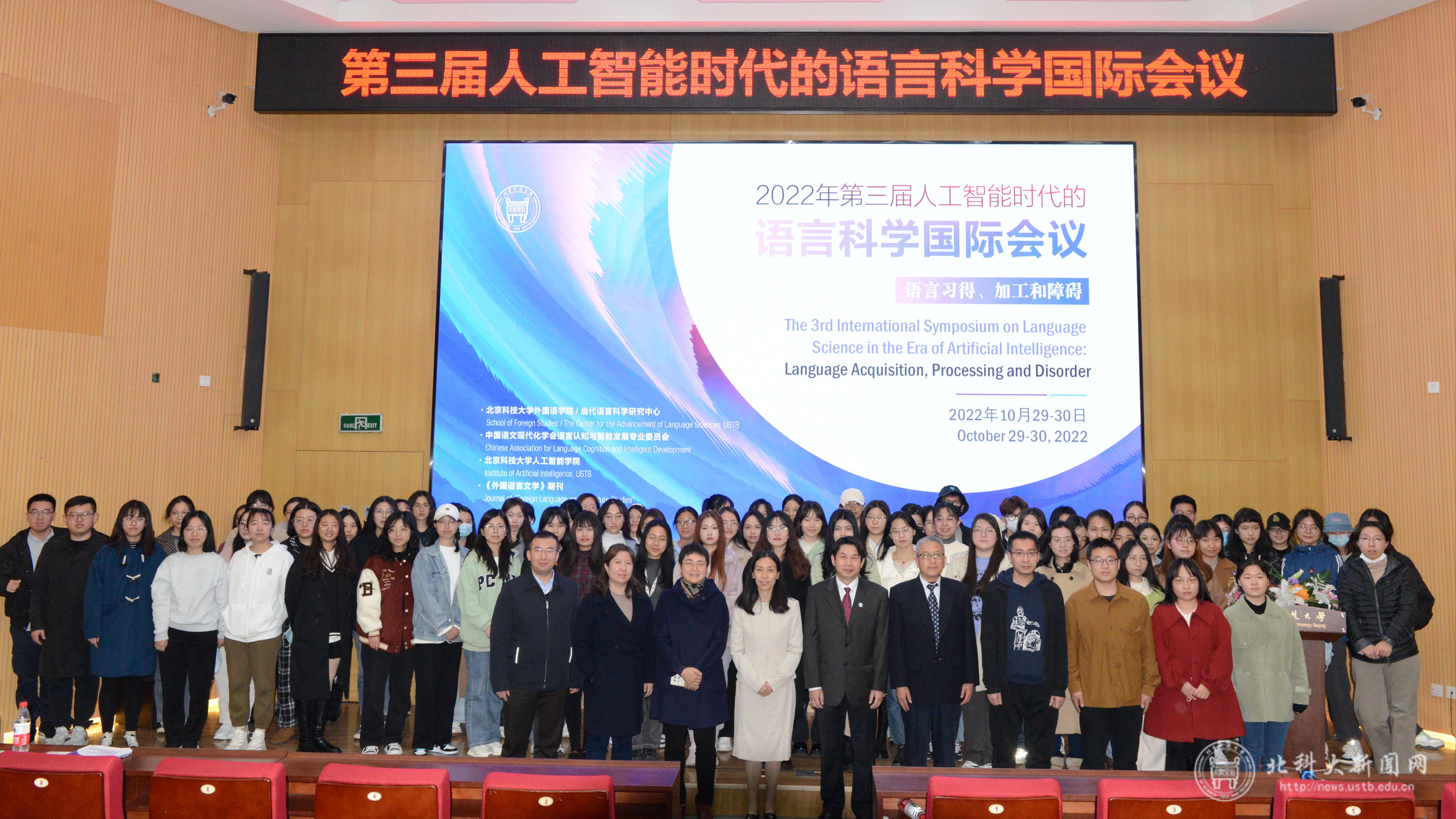 Group photo of on-site participants
Group photo of on-site participants
The conference covered the latest research results in neuroscience, speech-language pathology, cognitive psychology, linguistics, translation, cognitive science, humanities, sociology, artificial intelligence and other disciplines, and was both theoretically profound and empirically forward-looking. The success of the symposium demonstrates the new achievements in the intersection of language science with cognitive neuroscience, psychology, artificial intelligence, and other disciplines. The conference has pointed out the direction for language science research in the era of artificial intelligence and will give a strong impetus to the interdisciplinary development of language science in China and promote international academic exchanges between language science and interdisciplinary research.
Draft: JI Shuang & ZHANG Guolin
Revision: CHENG Mingyuan
Topics
Date
Views